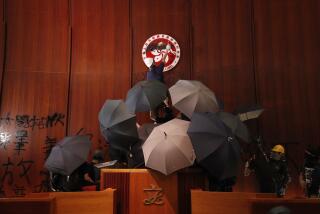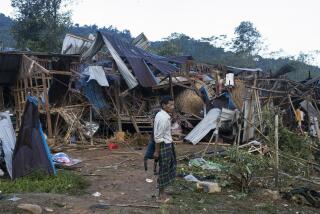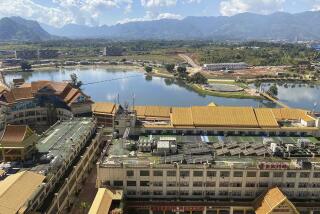From the Archives: China Orders Martial Law, Deploys Troops in Tibet
BEIJING -- China declared martial law in the Tibetan capital of Lhasa on Tuesday as the most serious pro-independence rioting in decades entered a third day.
Thousands of Chinese soldiers began taking control of the city shortly after midnight, according to Western witnesses and the official New China News Agency.
“Troops have been deployed in designated places,” the news agency reported, quoting Maj. Gen. Zhang Shaosong, political commissar of the Tibet Regional Military Command. “Soldiers were patrolling in the streets.”
Lhasa authorities issued orders establishing security checks for traffic into the city, banning all gatherings. Tourists at several hotels were told by police that all foreigners must leave Lhasa by noon Thursday.
Under the new regulations, “any person who defies martial law or who instigates others to do so will be severely punished,” the news agency reported.
Angry Tibetan crowds continued through much of the day Tuesday to ransack Chinese-owned stores and attack ethnic Chinese, while police sometimes opened fire, according to Western tourists who spoke by telephone with reporters in Beijing. Truckloads of troops moved in to impose order on the Tibetan quarter of the city, where most of the violence had occurred, tourists said.
“There’s a lot of sirens going and a lot of troop movement outside,” an American tourist said.
Reports on casualties were not immediately available, but the scale of Tuesday’s violence appeared to be less than on the previous two days.
Clashes between police and protesters Sunday and Monday left 12 people dead and more than 100 injured, according to the state-controlled Chinese media. Many Western tourists said those figures appear to be too low. Most tourists, basing their comments partly on reports by Tibetans, estimated the number of dead at 20 to 50.
About 50 to 100 protesters staged a noontime pro-independence march Tuesday carrying the outlawed flag of Tibetan independence, tourists said. The protesters then joined rioters in ransacking Chinese-owned stores and burning the contents in the streets.
Police briefly cleared some streets later Tuesday afternoon by ordering people to go indoors and threatening to shoot anyone who refused, according to an American who spoke by telephone with a reporter in Beijing.
But in the late afternoon, Tibetans came into the streets again, and by sunset another Chinese-owned store was ransacked and its contents burned in a street bonfire.
A Canadian tourist who was reached at a hotel in the Tibetan quarter Tuesday evening said that the city seemed to be fairly calm but that police were searching houses and making arrests.
Most tourists who have spoken with reporters in Beijing have declined to give their names for fear of official retaliation. China imposes severe restrictions on access to Tibet by Beijing-based correspondents, with the result that Western tourists have been key witnesses during this and previous incidents.
The latest protests began Sunday after a group of about a dozen Buddhist monks and nuns circled central Lhasa’s Jokhang Temple in a noontime pro-independence demonstration. They were soon joined by a crowd of several hundred, and a clash broke out in front of a nearby police station.
The official Chinese media have said that several hours later, after serious rioting had already spread to nearby parts of the city, three police officers were shot, one fatally, by a Tibetan sniper. Only after this, according to the official version of events, did police open fire on the rioters.
Several Western tourists, however, told reporters that police opened fire shortly after noon Sunday, shooting from rooftops at demonstrators outside the police station. This is what sparked the subsequent violence, according to these tourists. No tourists have reported seeing any Tibetans with firearms.
This is the fourth time in 18 months that pro-independence protests in Lhasa have been suppressed with bloodshed. Official Chinese reports of earlier incidents have appeared to understate the number of casualties and the level of police violence. In several cases, in the face of overwhelming evidence from foreign witnesses, Chinese authorities have later admitted that initial reports were false.
Tuesday’s martial-law order states that foreigners “are required to leave when instructed to do so by authorities,” the New China News Agency reported. An estimated 50 to 100 foreign tourists are presently in Lhasa, and their expulsion is likely to sharply limit outside knowledge of subsequent events.
The declaration of martial law, taking effect at midnight Tuesday, was issued in the name of the State Council, China’s Cabinet, and signed by Premier Li Peng, the New China News Agency reported.
“The decision was made in view of the fact that some separatists have been constantly causing disturbances in the city over the past few days, severely disrupting social stability there,” the agency said.
China has firmly controlled Tibet since 1951. The region was part of the Chinese empire during the Qing Dynasty but had de facto independence after 1911. China now treats advocacy of independence as treason.
This month is the 30th anniversary of an abortive anti-Chinese uprising that resulted in the Dalai Lama, traditionally the temporal and spiritual leader of Tibet, fleeing to exile in India. It was widely expected that the anniversary would be marked by clashes between pro-independence protesters and police.
Large-scale violence swept Tibet during the 1966-76 Cultural Revolution, when bands of Red Guards destroyed monasteries and forced monks to work in the fields.
In another type of conflict, bands of Tibetan guerrillas who never accepted Chinese rule were still fighting Communist forces as recently as the mid-1970s. But there have been no pro-independence demonstrations since 1959 equal in scale to the present disturbances.
The Dalai Lama, still based in India, and Beijing officials have had contacts aimed at the possibility of opening negotiations about Tibet’s future, but little progress has been reported.
Shortly after the current outbreak of violence, the Dalai Lama appealed to world leaders to press the Chinese government “to stop the continued violations of human rights and find an early solution to the deteriorating situation in Tibet.”
Speaking Tuesday at a religious gathering in northern India at the Tibetan refugee center of Dharmsala, the Dalai Lama issued a call to Tibetans to shun violence, according to a report by the Associated Press.
“It is our right to demonstrate, but it must be nonviolent,” the Dalai Lama said. “Burning of houses and properties should not have happened. We must have faith in nonviolent struggle.”
Dalai Lama Blamed
Beijing, however, stepped up efforts Tuesday to blame the rioting on the Dalai Lama, without specifically naming him, by attributing the violence to outside interference.
The New China News Agency repeated charges that some rioters were armed, then quoted Lhasa police officials as saying that the guns “appear” to have been smuggled in from abroad.
In Geneva, the Chinese delegate to the U.N. Human Rights Commission charged that the rioting was triggered by Tibetan refugee terrorists.
More to Read
Start your day right
Sign up for Essential California for news, features and recommendations from the L.A. Times and beyond in your inbox six days a week.
You may occasionally receive promotional content from the Los Angeles Times.






